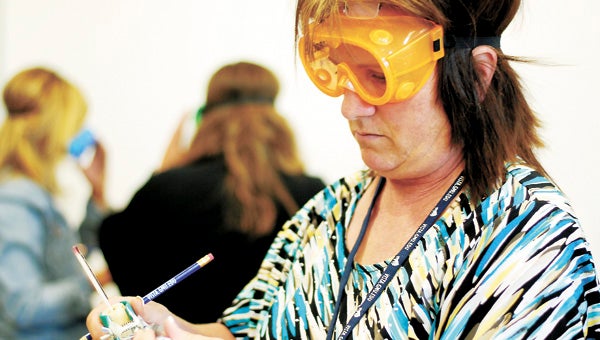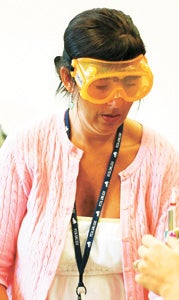Hillpoint teachers lead the way
Published 11:31 pm Friday, July 12, 2013

Paula Beckett, a teacher at Hillpoint Elementary School, learns new ways to teach science during a program at the College of William & Mary that fits into a much wider plan.
Two teachers from Hillpoint Elementary School were selected for an ambitious research project reportedly funded with one of the largest grants the U.S. Department of Education has ever awarded.
Kimberly Nierman and Paula Beckett are attending the Elementary Science Institute at the College of William & Mary, step one of their involvement in the Virginia Initiative for Science Teaching and Achievement.
Laurie Fry, spokeswoman for the initiative whose lead institution is George Mason University, said it has been awarded $34 million over five years to prove that hands-on, problem-based learning — as opposed to traditional teacher-led classrooms — increases student achievement.

Kimberly Nierman, a teacher at Hillpoint Elementary School, learns new ways to teach science during a program at the College of William & Mary that fits into a much wider plan.
“Teachers are either put into the program right away or put into a control group,” Fry said.
Program teachers implement the new teaching methods straight away, while control-group educators stick with traditional methods for one year before switching.
“We measure the difference between the teachers that have had the training and the teacher’s that haven’t,” Fry said.
The five-year initiative entering its third year has just expanded from one site to four sites across the state, she said.
The program the Hillpoint teachers are attending in Williamsburg started June 24 and runs through July 25.
It’s a valuable professional development opportunity that’s not costing them anything, Fry said.
Area students were invited to a free, two-week camp that began Monday, providing a chance for teachers to practice what they’re learning.
Teacher participants also receive a $5,000 stipend and $1,000 in teaching resources, science materials and online content.
They are assigned master teachers to help them adapt to the new method during the school year, as well as given an expenses-paid trip to the Virginia Association of Science Teachers Professional Development Institute this fall.
Other studies have shown the new teaching methods help students learn, “but there hasn’t been any definitive study that proves it,” Fry said.
“The goal is for it to become accepted research-based best practice.”
Nationwide, many students are falling behind in STEM (science, technology, engineering and math) subjects, compared to other subjects. Experts fear this could hold America back on the global playing field.
“The country as a whole, with support from the White House, has made STEM a priority,” Fry said. “They want more scientists in this country.”
If the results prove what already has been demonstrated, the best-practice instructional methods would spread from Virginia to other states, she said.
“Virginia is like a Petri dish,” Fry said. “This is a paradigm shift, and it’s hard to do that in education.”






